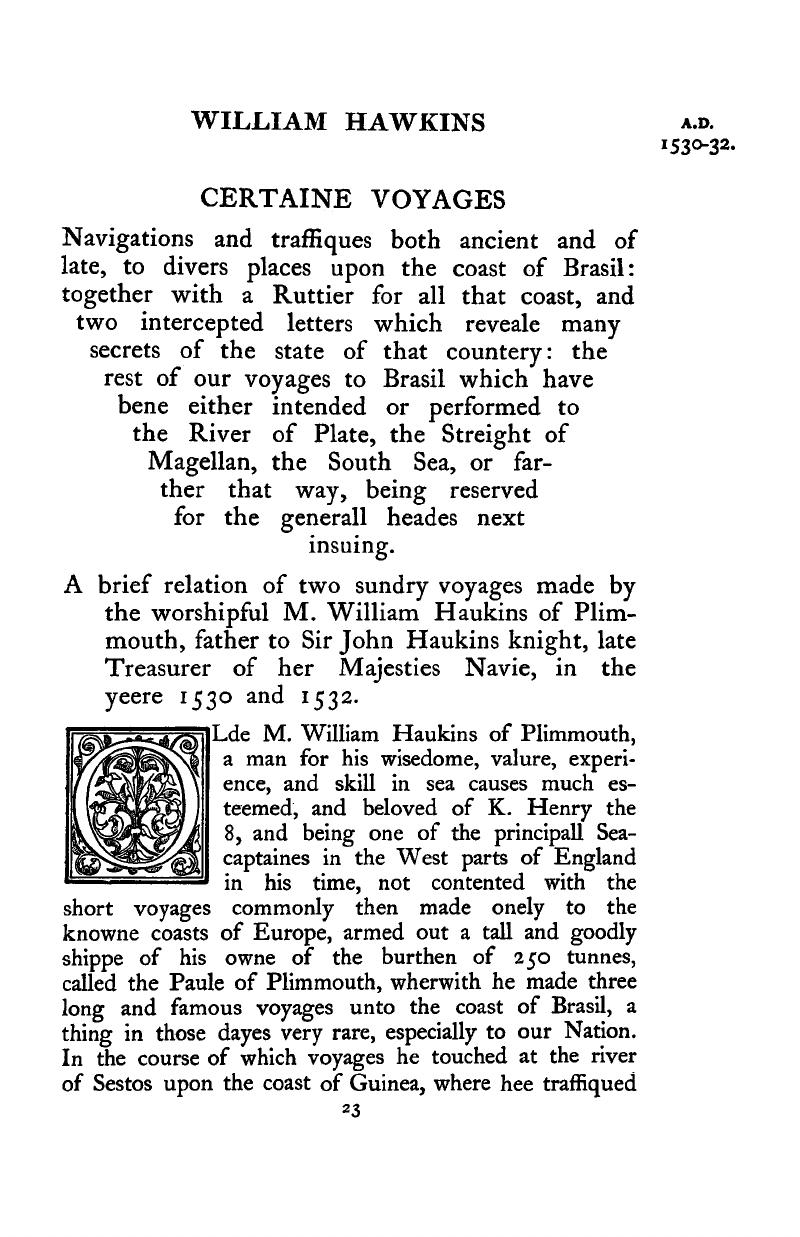5 First English Slave Trader (1530)
 William Hawkins of Plymouth County in Devon was the first Englishman to sail to Brazil. As a boy, he may have been a page in the English delegation that negotiated the marriage of King Philip II of Spain and Queen Mary I of England, which made Philip King of England during Mary’s lifetime. It is rumored that Philip knighted William, who was later knighted again by Elizabeth I for his service. He became wealthy as an early operator of the Triangle Slave Trade, was a Member of Parliament, and his second son was Sir John Hawkins.
William Hawkins of Plymouth County in Devon was the first Englishman to sail to Brazil. As a boy, he may have been a page in the English delegation that negotiated the marriage of King Philip II of Spain and Queen Mary I of England, which made Philip King of England during Mary’s lifetime. It is rumored that Philip knighted William, who was later knighted again by Elizabeth I for his service. He became wealthy as an early operator of the Triangle Slave Trade, was a Member of Parliament, and his second son was Sir John Hawkins.
Old Mr. William Hawkins of Plimmouth, a man for his wisdom, valor, experience, and skill in sea causes much esteemed and beloved of King Henry the VIII and being one of the principal Sea Captains in the West parts of England in his time, not contented with the short voyages commonly then made only to the known coasts of Europe, armed out a tall and goodly ship of his own of the burden of 250 tons called the Pole of Plimmouth. Wherewith he made three long and famous voyages unto the coast of Brasil, a thing in those days very rare, especially to our Nation. In the course of which voyages he touched at the River of Sestos upon the coast of Guinea, where he trafficked with the Negroes and took of them Elephants’ teeth and other commodities which that place yields. And so arriving on the coast of Brasil, used there such discretion and behaved himself so wisely with those savage people that he grew into great familiarity and friendship with them. Insomuch that in his second voyage, one of the savage kings of the Country of Brasil was contented to take ship with him and to be transported hither into England. Whereunto Mr. Hawkins agreed, leaving behind in the Country as a pledge for his safety and return again one Martin Cockeram of Plimmouth. This Brasilian king being arrived, was brought up to London and presented to King Henry the VIII, lying as then at Whitehall. At the sight of whom the King and all the Nobility did not a little marvel and not without cause; for in his cheeks were holes made according to their savage manner and therein small bones were planted, standing an inch out from the said holes, which in his own Country was reputed for a great bravery. He had also another hole in his nether lip wherein was set a precious stone about the bigness of a pea. All his apparel, behavior, and gesture, were very strange to the beholders.
Having remained here the space almost of a whole year and the king with his sight fully satisfied, Mr. Hawkins according to his promise and appointment, purposed to convey him again into his Country. But it fell out in the way, that by change of air and alteration of diet the said Savage king died at Sea, which was feared would turn to the loss of the life of Martin Cockeram his pledge. Nevertheless, the Savages being fully persuaded of the honest dealing of our men with their Prince, restored again the said pledge without any harm to him or any man of the company. Which pledge of theirs they brought home again into England, with their ship freighted and furnished with the commodities of the Country. Which Martin Cockeram by the witness of Sir John Hawkins, being an officer in the town of Plimmouth, was living within these few years.
Source: “The First English Slave Trader” (1530), Richard Hakluyt, The Principal Navigations, Voyages, and Discoveries of the English Nation (London, 1589), 520-521., American History Told by Contemporaries, Albert Bushnell Hart, 1897, 73-4. https://archive.org/details/in.ernet.dli.2015.45493/page/n93/mode/2up
